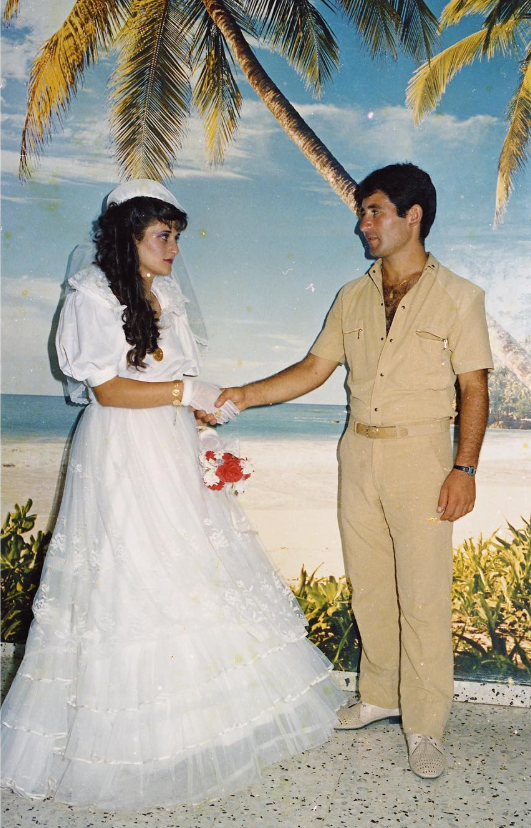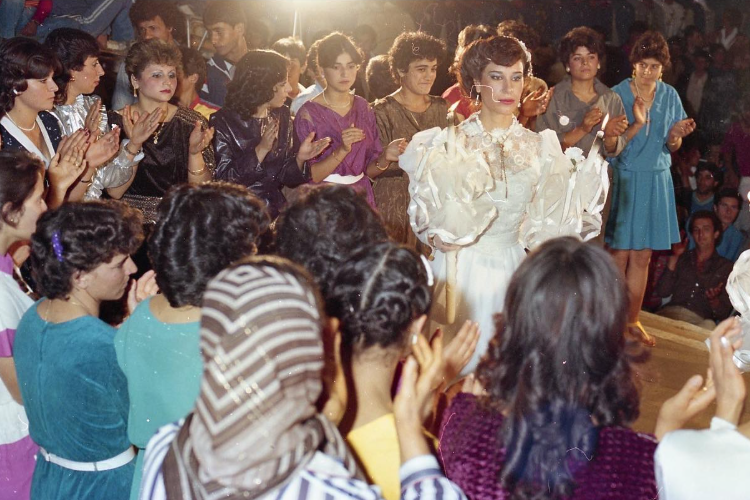Words by Sara El-Sayeh
Images courtesy of Photo Studio Al-Ameen
This article is part of the “Sana wara Sana” issue
To reimagine economies of care as more than just an argument for compensating care work; it’s about seeing care as central to society, unbinding economies from capitalism.
Reimagining care back into our lives happens through weaving a more comprehensive fabric of economic activity and, in the process, potentially undoing the story of isolation in modernity. It might take working fewer hours, less commuting, and looking toward more collective structures, toward communing. And, I know it would definitely take more imagining: what would a life and livelihood where care is central and centered look like?
“Positive Externalities”
I see more braids of multigenerational communities: well-rested mothers, grandmothers in company, attention satiated kids. Like with economies of scale, there are “positive externalities” that happen, effects that emerge not by design, when we come together and care for each other. Being from a country where systems of capitalism and modernity have never really worked, I feel like this is a message from the future for countries where the systems are just freshly crumbling.
Where I come from, in many ways, the need for appearing civilized comes in the form of consuming more and outsourcing care in ways that aren’t even accessible to most families in “developed” countries. I don’t exactly know when it started, but I assume it was with the rise of the factory in the Nasserite era that the race for modernity began and has been gaining momentum since. But our origin story is one of care: grandmothers cared for their grandchildren, nephews, and nieces cared for aging aunts, and cousins carried younger cousins on the hip as they walked round the corner to run an errand. We lived close to one another for centuries. Neighbors were like family.
I’m not here to offer cultural critique or commentary, but to offer a reimagined definition of economies of care. I believe that if we go to the root of the word economy, economics or economies, we find care as an essential component.
So perhaps this is an oracular critique from the depths of the desert where my ancestors have roamed and made a living. I do recognize the irony in using a definition from some of my homeland’s earliest conquerors, the Greeks, but:
“Oikonomia” is a term that originates from ancient Greek, meaning “household management.” It often relates to economics, but carries deeper implications regarding care, community, and sustainability.
Care Under Capitalism
I got pregnant with my first child a few months after quitting a job that I loved so much that I’d burned out, it had frayed me at the edges. After a brief psychotic episode, I quit my job and decided to “choose myself.” Similarly, I chose my child when I didn’t send him to daycare because I didn’t have a job to “return” to. With that decision – and the cascade of realizations that came with it – it finally dawned on me: capitalism wasn’t built with the practice of care in mind, let alone care itself.
For years, I sat with the grief of it, of trying not to be forgotten by everyone around me who was part of the system. Busy with work, busy with deadlines, I received messages – subliminal or not – around my empty life, questions about what would possibly make me feel tired when I sit around and do nothing all day, judgments around why I need to spend that much money. I’m happy to share my monthly expenses with anyone who’s curious, but I can safely say that not working costs me less money than working.
I slowly fell off the social radar, far from the race for consumption and into a bottomless pit of isolation. Isolation often comes with a shedding of skin and light alike. It’s both illuminating and painful. Living under modernity, in a nuclear family, a two parent household, isolation feels unfair. And in a single parent household, isolation could be deadly.
When I was still married, before I had my second child, I tried to work from an office a few times. And because of agreements not going as planned, l was eventually fired given how long it took me to get to work every day. I opted for the economically poorer, yet richer in care and tending model, because I couldn’t find the care and tending I required in the early days of motherhood.

To work, right now, would mean to hire out all the house and child tending roles that I often like doing. I cannot rely on family, including their own father, to help with my children, mostly due to capitalism. Care offers no financial return, yet we’ve been wired to seek it, to “look after ourselves” in that way. So, to engage in care first and money second, leaves the burden of getting things done on me, the person with the fewest financial resources.
To lighten the load of care under capitalism, I imagine that I’m a magician, a sorceress, and an oracle. I imagine that the words I write are prophecy and portal into a future where economies are centered around care rather than extraction. Where there are reciprocal ties of tending nurturance and care, there’s more room for humanity – that’s not to say it comes without fault, but rather to say that it comes with more grace.
CARE ECONOMIES
“Care economy refers to the sector of economic activities, both paid and unpaid, related to the provisions of social and material care, which contribute to nurturing and supporting the present and future populations.”
I once joined a “foreign expert” in the field during my days as a “technical professional” at an international development agency. We visited my grandfather’s hometown of Fayoum, where I led a focus group with farmer wives, asking them about the exchange they receive for income generating activities on the farm.
These women led a very different life than mine – after all, my grandfather left to Cairo to get an education and by virtue of the social mobility that afforded him. But still, there I was, a young woman with a master’s degree in economics in international development, telling them to ask for money in return for what they considered household tending.
Years later, I now realize they never needed me – I needed them. They showed me what the true meaning of care economies is. Care economies, or economies of care, are about far more than financial exchange and income generation. In fact, I could argue (to some extent, I believe) that care economies, like commerce, can and will exist in the absence and collapse of money.
QULQA
Wallflowers.
Healers.
Outcasts.
And people who don’t engage with capitalism tend to lie at the periphery.
Mothers.
Unemployed people in their 30s and up.
Society has given them many a label: failures, creative misfits and miserable artists are among those and because they don’t work for capitalism, capitalism doesn’t work for them, leaving them in a worse off place financially.
What this often means is that wallflowers would tend to find alternatives to capitalism, which are essentially all centered around care. There’s newness to them, ingenuity, and there’s also an ancient nature to them. We’re not creating communal spaces, we’re essentially bringing back the commons. We’re not creating circular or sacred economies, we’re bringing back the qulqa.
The Quechuan “qulqa” (also “qollqa”) were storage houses used by Andean communities to store surplus grain. The community-based structure offered a sense of security and resourcefulness to the community. Everyone could access these resources in times of need, and need was not questioned. Integrity was trusted.
I was first introduced to the concept by a Columbian traveler friend who visited my house with a group of people. He held up a bowl calling “qulqa, qulqa, qulqa” as he asked everyone to put something in the bowl (and it didn’t have to be money!). Anyone in the room could take what they needed, and what was left at the end of the gathering was given to the hosts.
This is how I would define economies of care, if it were up to me. It is how people come together to tend and attend to the needs of others, expressed or not, without having to worry about whether this would be engaging in contempt or other ways of over philosophizing that have us remain disengaged and isolated.
Though I’ve never lived in a village, I recognize the romanticized “takes a village” adage. I have, however, had my kids as part of a community, and I have observed a few things from that experience. As someone on a path that asks of me to attend weekly gatherings, the few hours a week I get to not be the sole adult around my kids, as a single mother, are my saving grace. To know that they are surrounded by people who care for them, who they consider aunts and uncles, is the only semblance of a village that I’ve come to know. My back gets to rest, my shoulders relax, my jaw unclenches. This is tending, this is care. And because it happens among a collective, this is what an economy is.
I cannot argue that it would be similar to how things would have been at the time of hunter-gatherers because back then groups grew up to 150 and Cairo is home to over 20 million people. But to me, care is an act of pure giving, and we’d be doing it a disservice to regard it in modern terms: transactional. I’m redefining the term to move beyond the capitalist nature of “paid and unpaid” labor, and to expand into – and remember – the reciprocity and solidarity of care for each other, when we are in true community rather than running away from the systems and structures of capitalism.
What if we thought about care in a way that’s similar to how we understand economies of scale: the more we care for each other, the more “benefits” there will be for everyone. Although this defies the central tenant behind care, it’s not transactional. Care is an act of pure giving, where everyone benefits. Care is an act of reciprocity and solidarity. And when we do it in groups, we create economies around it.

